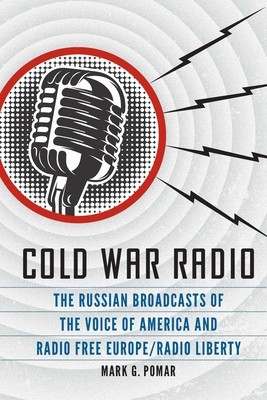
- We will send in 10–14 business days.
- Author: Mark G Pomar
- Publisher: Potomac Books
- Year: 2022
- Pages: 344
- ISBN-10: 1640125140
- ISBN-13: 9781640125148
- Format: 15.4 x 23.2 x 3.6 cm, kieti viršeliai
- Language: English
- SAVE -10% with code: EXTRA
Reviews
Description
Cold War Radio is a fascinating look at how the United States waged the Cold War through the international broadcasting of Voice of America (VOA) and Radio Free Europe/Radio Liberty (RFE/RL). Mark G. Pomar served in senior positions at VOA and RFE/RL from 1982 to 1993, during which time the Reagan and Bush administrations made VOA and RFE/RL an important part of their foreign policy. VOA is America's "national voice," broadcasting in more than forty languages, and is charged with explaining U.S. government policies and telling America's story with the aim of gaining the respect and goodwill of its target audience. During the Cold War, the VOA Russian Service broadcast twenty-four hours a day, seven days a week. RFE/RL is a private corporation, funded until 1971 by the CIA and afterward through open congressional appropriations. It broadcast in more than twenty languages of Central and Eastern Europe and Eurasia and functioned as a "home service" located abroad. Its Russian Service broadcast news, feature programming, and op-eds that would have been part of daily political discourse if Russia had free media. Pomar takes readers inside the two radio stations to show how the broadcasts were conceived and developed and the impact they had on international broadcasting, U.S.-Soviet relations, Russian political and cultural history, and the dissolution of the Soviet Union. Pomar provides nuanced analysis of the broadcasts and sheds light on the multifaceted role the radios played during the Cold War, ranging from instruments of U.S. Cold War policy to repositories of independent Russian culture, literature, philosophy, religion, and the arts. Cold War Radio breaks new ground as Pomar integrates his analysis of Cold War radio programming with the long-term aims of U.S. foreign policy, illuminating the role of radio in the peaceful end of the Cold War.EXTRA 10 % discount with code: EXTRA
The promotion ends in 23d.07:05:21
The discount code is valid when purchasing from 10 €. Discounts do not stack.
- Author: Mark G Pomar
- Publisher: Potomac Books
- Year: 2022
- Pages: 344
- ISBN-10: 1640125140
- ISBN-13: 9781640125148
- Format: 15.4 x 23.2 x 3.6 cm, kieti viršeliai
- Language: English English


Reviews